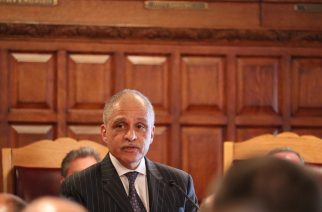
Sen. Jessica Ramos, at podium, explains the need for her Treatment Not Jail bill during a rally in the state Capitol on Tuesday. The legislation would create more judicial diversion courts across the state to promote treatment for those with addictions, mental health concerns and other disabilities, instead of a jail sentence.
Echoing through the Million Dollar Staircase in the State Capitol on Tuesday, passers-by heard only one thing; “WHAT DO WE WANT? TREATMENT NOT JAIL! WHEN DO WE WANT IT? NOW!”
The rallying cries expressed passionate support for a bill introduced by Sen. Jessica Ramos; the Treatment Not Jail Bill (S.1976/A.1263), which is meant to ensure that New Yorkers with substance use disorders, mental health concerns, and other disabilities have an “off-ramp” from the criminal legal system to obtain treatment and support in their communities.
“We want to make sure that our children don’t grow up in a world where everyone is succumbed to the wills of prosecutors and defense attorneys and judges, who may be experts in the law, but are not experts in public health,” Ramos said during Tuesday’s rally.
Treatment Not Jail — which was originally introduced in the 2019-2020 legislative session — would amend criminal procedural law by expanding the number of judicial diversion programs available. This would allow incarcerated inmates and those put on probation to have easier access to mental health care and clearly defines what qualifies somebody to have access to these resources, including those struggling with addiction, intellectual disabilities, and physical trauma.
It would also extend these resources to those charged with misdemeanor offenses, since “thousands of people are frequently targeted by police or arrested for low-level misdemeanors or violations,” according to the justification in the bill memo.
“We cannot continue to treat human beings as if they are animals in a cage. This is the time. We cannot allow people to control the narratives of our communities,” said Ramos, D-Jackson Heights. “We have to make sure that we convince [Gov. Kathy Hochul] that her $1 billion over here is the smartest move and best investment.”
In Hochul’s State of the State Address on Jan. 10, the governor cited the “public safety crisis” of inadequate mental health care in New York. She followed by promising that she will invest $1 billion on “critical policy changes to fully meet the needs of our state.” Among other areas of concern on her agenda, she made sure that public safety and mental health resources were of top priority.
“Right now, nearly 3,200 New Yorkers struggling with severe mental illness or addiction are living on the street and subways,” Hochul said during her State of the State Address. “At the same time, we have insufficient levels of inpatient psychiatric beds and outpatient services. We will add 1,000 inpatient psychiatric beds, funding 150 new beds in State facilities and bringing 850 psych beds in hospitals back on line.”
However, considering the 5,559 daily inmate population on Riker’s Island alone — not to mention the population of 44 New York State prisons — Ramos isn’t convinced that the 1,000 psychiatric beds will be enough.
A U.S. Department of Justice study estimates that 54 percent of inmates in state prisons nationwide are struggling with mental illness.
“It’s just a drop in the bucket,” says Ramos. “We need real mental health facilities to help those that need treatment, longer treatment, and then being able to stay perhaps with their families immediately after. We can’t forget that these folks have family members and children, and the last thing we need to do is perpetuate cycles of violence and harm.”
The Senate bill resides in the the Alcoholism and Substance Abuse Committee.
The companion bill (A.1263), sponsored by Assembly Member Phara Souffrant Forrest, D-Crown Heights, is in the Assembly Codes Committee.









